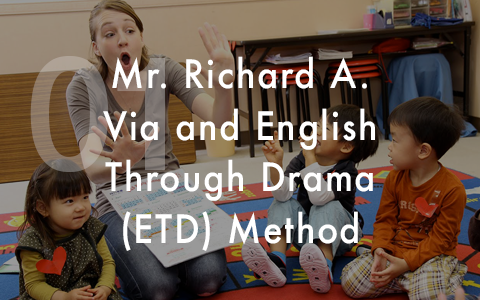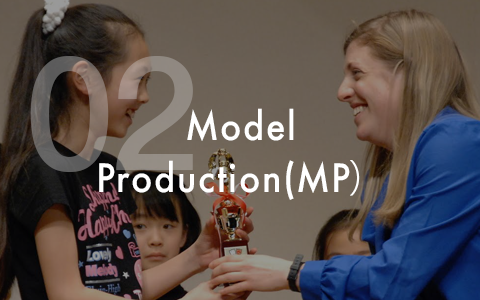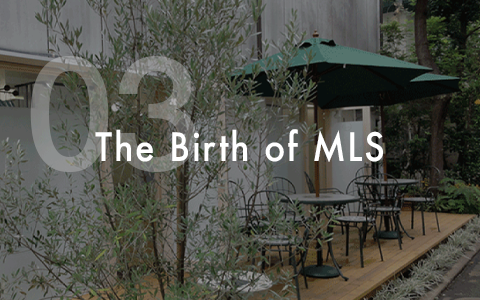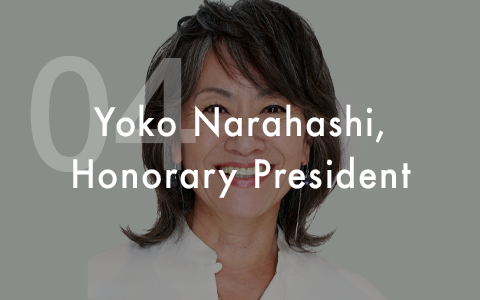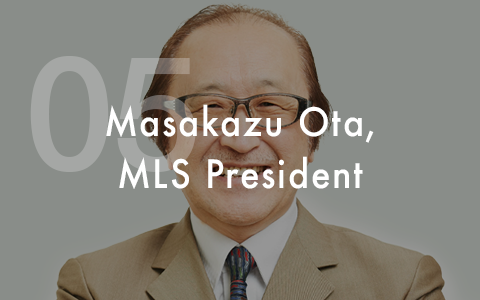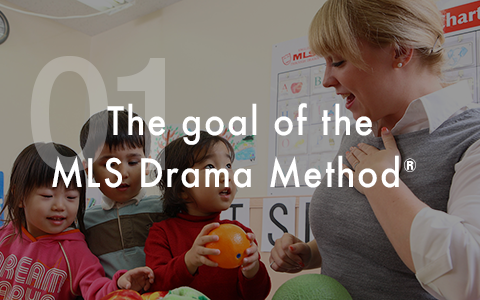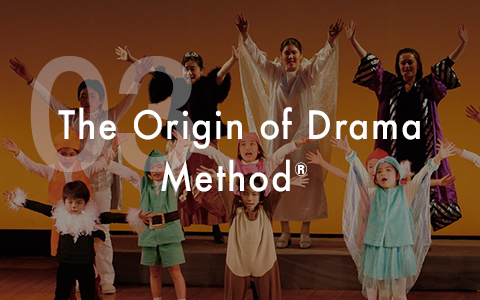
MLS History & Drama Method
Mr. Richard A. Via
and English Through Drama (ETD) Method
Richard A. Via, Honorary Advisor to MLS, has been active in the US for 23 years as a Broadway actor, director and stage manager. In 1967, Via visited Japan when he was invited by the American Culture Center to supervise the stage directing of the professional American-cast musical performance of “Hello Dolly!” After the performance, Via gave a lecture titled American Drama. Following the lecture he was approached by a group of Japanese university students who said, “We’re giving an English performance at our university too, and we’d like some advice.” When Via saw their performance he was very surprised to see that “they were very far from actually communicating and were trying to be someone they weren’t.” At that point, he decided to stay in Japan “to teach them how to really communicate and adopt an acting style that would genuinely enhance the individual personality,” a style that was already popular in the US. He stayed on for three years as a Fulbright scholarship student to teach an acting method used by professionals. While he was in Japan, he directed plays for Japanese university students. He discovered that their English conversation skills improved greatly as a result of his having given English directing advice while they practiced the parts in English. This was the moment that the English Through Drama (ETD) Method® was born.
Mr. Richard A. Via
and English Through Drama (ETD) Method
Richard A. Via, Honorary Advisor to MLS, has been active in the US for 23 years as a Broadway actor, director and stage manager. In 1967, Via visited Japan when he was invited by the American Culture Center to supervise the stage directing of the professional American-cast musical performance of “Hello Dolly!” After the performance, Via gave a lecture titled American Drama. Following the lecture he was approached by a group of Japanese university students who said, “We’re giving an English performance at our university too, and we’d like some advice.” When Via saw their performance he was very surprised to see that “they were very far from actually communicating and were trying to be someone they weren’t.” At that point, he decided to stay in Japan “to teach them how to really communicate and adopt an acting style that would genuinely enhance the individual personality,” a style that was already popular in the US. He stayed on for three years as a Fulbright scholarship student to teach an acting method used by professionals. While he was in Japan, he directed plays for Japanese university students. He discovered that their English conversation skills improved greatly as a result of his having given English directing advice while they practiced the parts in English. This was the moment that the English Through Drama (ETD) Method® was born.
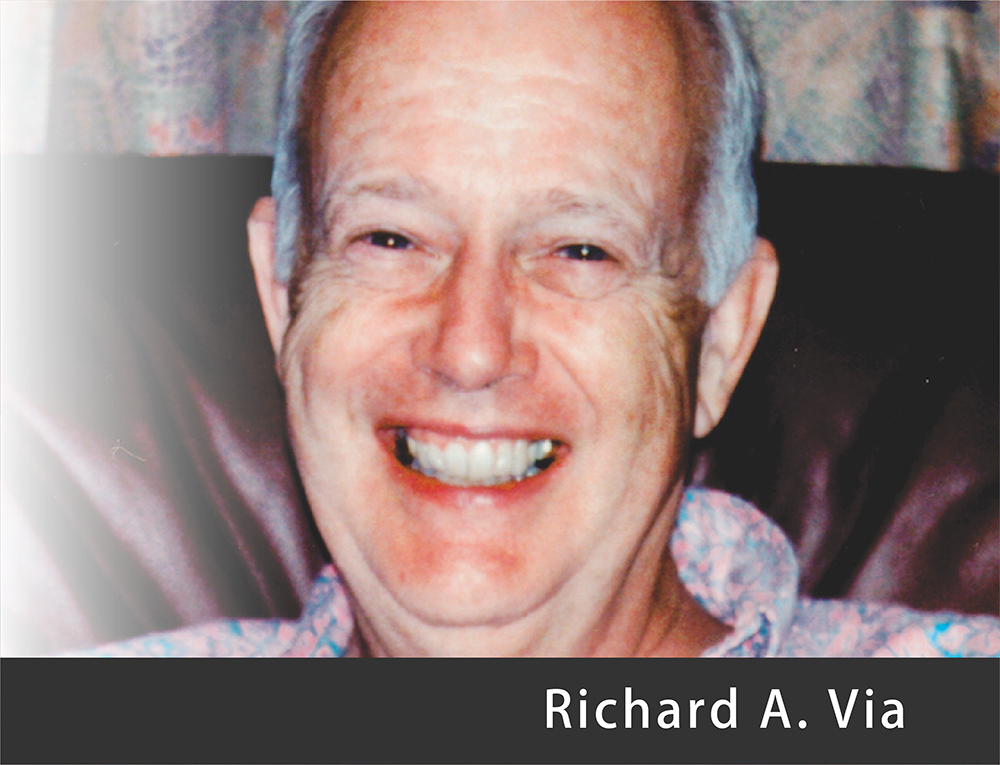
Model Production (MP)
Via, who discovered the English Through Drama Method®, gathered together the Tokyo area Universities English Speaking Society members and organized the Tokyo Student English Play League. The cast and staff adopted the method of using only English from the first rehearsal to the actual performance. During this time the group developed a close relationship that went beyond the university campus. They founded a new group, which they called Model Production (MP) to symbolize the role they hoped this newly formed English Theatrical Group would play as role model for other groups in the future. MP was started in 1967 and still continues to grow today. Alumni have gone on to be very successful in numerous professional fields. NHK radio English Conversation Program personality Ken Toyama, actors Masatoshi Nakamura, Tetsuya Bessho, Masayuki Imai, Jay Kabira, Tomoko Fujita and stage designer Toru Shimakawa are just a few of the MP alumni.
Model Production (MP)
Via, who discovered the English Through Drama Method®, gathered together the Tokyo area Universities English Speaking Society members and organized the Tokyo Student English Play League. The cast and staff adopted the method of using only English from the first rehearsal to the actual performance. During this time the group developed a close relationship that went beyond the university campus. They founded a new group, which they called Model Production (MP) to symbolize the role they hoped this newly formed English Theatrical Group would play as role model for other groups in the future. MP was started in 1967 and still continues to grow today. Alumni have gone on to be very successful in numerous professional fields. NHK radio English Conversation Program personality Ken Toyama, actors Masatoshi Nakamura, Tetsuya Bessho, Masayuki Imai, Jay Kabira, Tomoko Fujita and stage designer Toru Shimakawa are just a few of the MP alumni.
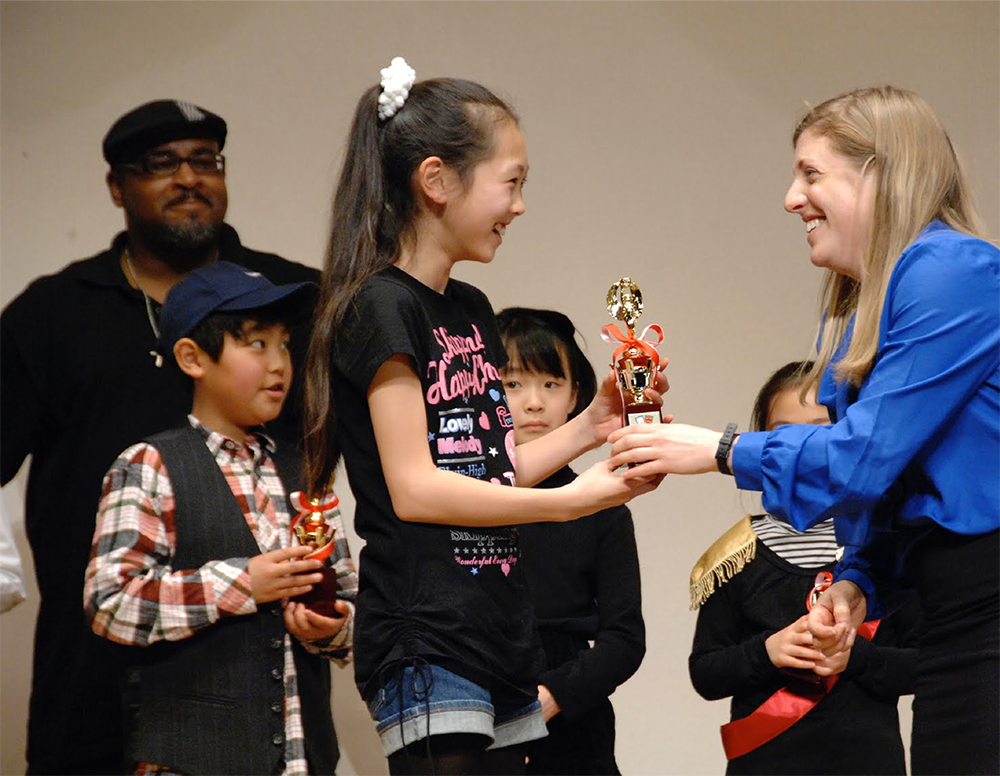
The Birth of MLS
It was at MP that Yoko Narahashi (MLS Honorary President) and Masakazu Ota (MLS President) met and came to know each other. Narahashi, who was a member of the MP 1967 cast, directed the 1973 performance while Ota, who was a member of MP 1972 cast, participated as an assistant director in 1973. Narahashi and Ota realized the great potential Via’s ETD Method had and decided to collaborate to establish an English school. As a result, they co-founded the Model Language Studio (MLS) in January of 1974. The official name of MLS comes from several sources. ‘Model’ is taken from the name of MP (Model Production). ‘Language’ was selected to represent their hopes to use the Drama Method® to teach several languages. ‘Studio’ was selected in honor of New York’s Actors Studio and because actors everywhere refer to their training locations as studios.
The Birth of MLS
It was at MP that Yoko Narahashi (MLS Honorary President) and Masakazu Ota (MLS President) met and came to know each other. Narahashi, who was a member of the MP 1967 cast, directed the 1973 performance while Ota, who was a member of MP 1972 cast, participated as an assistant director in 1973. Narahashi and Ota realized the great potential Via’s ETD Method had and decided to collaborate to establish an English school. As a result, they co-founded the Model Language Studio (MLS) in January of 1974. The official name of MLS comes from several sources. ‘Model’ is taken from the name of MP (Model Production). ‘Language’ was selected to represent their hopes to use the Drama Method® to teach several languages. ‘Studio’ was selected in honor of New York’s Actors Studio and because actors everywhere refer to their training locations as studios.

Yoko Narahashi,
Honorary President
Yoko Narahashi lived in Canada from the age of five until she graduated from high school. Upon returning to Japan, she completed a degree in linguistics at the International Christian University before going to New York to study drama at the Neighborhood Playhouse of Theater. In addition to serving as Honorary President of MLS, Narahashi is also an English education specialist who has worked for many years as a radio instructor for the English program “English for Millions.” She has written academic material including a high school textbook published by Kirihara Shoten and children’s material including 1, 2, Jump and HAPPY TALK. She also supervised the Japanese edition of Sesame Street’s Home Video and the English dictionary video Actionary with CD ROM, as well as many other projects. Narahashi has made a name for herself as a lyricist for the rock group Godaigo and has written the lyrics for numerous English songs including the hit songs “Gandhara” and “Beautiful Name.” Narahashi won the prestigious Cultural Award in 1990 and the United Nations Performing Arts Award for directing a New York production of The Winds of God. She also directed the movie version, released by Shochiku in 1995, that won the fourth Special Prize of the Yubari International Adventure Films. As a director, she has also produced Hair, Flowers for Algernon and Moonlit Club. In 1982 Narahashi established the United Performers’ Studio(UPS) to discover and develop new talents that can accommodate the international audience. Narahashi’s recent work includes casting Japanese actors in Hollywood films such as The Last Samurai and Sayuri.
Yoko Narahashi,
Honorary President
Yoko Narahashi lived in Canada from the age of five until she graduated from high school. Upon returning to Japan, she completed a degree in linguistics at the International Christian University before going to New York to study drama at the Neighborhood Playhouse of Theater. In addition to serving as Honorary President of MLS, Narahashi is also an English education specialist who has worked for many years as a radio instructor for the English program “English for Millions.” She has written academic material including a high school textbook published by Kirihara Shoten and children’s material including 1, 2, Jump and HAPPY TALK. She also supervised the Japanese edition of Sesame Street’s Home Video and the English dictionary video Actionary with CD ROM, as well as many other projects. Narahashi has made a name for herself as a lyricist for the rock group Godaigo and has written the lyrics for numerous English songs including the hit songs “Gandhara” and “Beautiful Name.” Narahashi won the prestigious Cultural Award in 1990 and the United Nations Performing Arts Award for directing a New York production of The Winds of God. She also directed the movie version, released by Shochiku in 1995, that won the fourth Special Prize of the Yubari International Adventure Films. As a director, she has also produced Hair, Flowers for Algernon and Moonlit Club. In 1982 Narahashi established the United Performers’ Studio(UPS) to discover and develop new talents that can accommodate the international audience. Narahashi’s recent work includes casting Japanese actors in Hollywood films such as The Last Samurai and Sayuri.

Masakazu Ota,
MLS President
Masakazu Ota started to learn English in junior high school as part of the standard curriculum that is taught to all students, but was especially enlightened by the English conversation skills he acquired through Via’s Drama Method when in university. After founding MLS, Ota devoted himself to developing it as a business while improving the Drama Method®. His efforts were focused on the international scene with ETD as the theme. He has established ties with drama companies from English speaking countries including Australia, Canada, New Zealand, The United Kingdom and The United States for the purposes of education and international exchange. His work includes organizing overseas performances of English plays by MLS students and arranging for theatrical groups from foreign countries to participate in tours of schools around Japan. Ota has also produced and directed joint International Productions where MLS students are given the opportunity to practice, collaborate and perform with professional actors from foreign countries. Ota’s original composition, Stories for You and Me (music by Yukihide Takekawa), based on the Drama Method®, won an award for excellence from the Kanto Teaching Staff Association and numerous other awards from the High School English Educational Play Competition. His recently published work, MLS English Script Set Collection, which has been approved by the Tokyo Metropolitan Government Office as a Creative Work (東京都中小企業創造的事業活動認定#1118号), has also won awards for excellence from the Tokyo English Educational Association and other English Educational Organizations. Ota has developed ETD on a more Educational level with the techniques of Super-STAGE. His newest publications, written with Claudia O Peretti (MLS vice-president), include Playing English with 25 Games and 15 Dialogues (an outline of the essence of the Drama Method®) and the Japan Times published The English Teaching Manual for Elementary School Teachers (a manual for English Teachers in Japanese public schools).
Masakazu Ota,
MLS President
Masakazu Ota started to learn English in junior high school as part of the standard curriculum that is taught to all students, but was especially enlightened by the English conversation skills he acquired through Via’s Drama Method when in university. After founding MLS, Ota devoted himself to developing it as a business while improving the Drama Method®. His efforts were focused on the international scene with ETD as the theme. He has established ties with drama companies from English speaking countries including Australia, Canada, New Zealand, The United Kingdom and The United States for the purposes of education and international exchange. His work includes organizing overseas performances of English plays by MLS students and arranging for theatrical groups from foreign countries to participate in tours of schools around Japan. Ota has also produced and directed joint International Productions where MLS students are given the opportunity to practice, collaborate and perform with professional actors from foreign countries. Ota’s original composition, Stories for You and Me (music by Yukihide Takekawa), based on the Drama Method®, won an award for excellence from the Kanto Teaching Staff Association and numerous other awards from the High School English Educational Play Competition. His recently published work, MLS English Script Set Collection, which has been approved by the Tokyo Metropolitan Government Office as a Creative Work (東京都中小企業創造的事業活動認定#1118号), has also won awards for excellence from the Tokyo English Educational Association and other English Educational Organizations. Ota has developed ETD on a more Educational level with the techniques of Super-STAGE. His newest publications, written with Claudia O Peretti (MLS vice-president), include Playing English with 25 Games and 15 Dialogues (an outline of the essence of the Drama Method®) and the Japan Times published The English Teaching Manual for Elementary School Teachers (a manual for English Teachers in Japanese public schools).

Claudia O. Peretti,
MLS vice President
Claudia came to Japan in 1974 and joined MLS from the early days. She developed the Drama Method® for MLS Junior classes. Claudia has also been engaged in the study of communication with an emphasis on English education.She has held several Board of Education-sponsored workshops and seminars throughout Japan. At the request of the Ministry of Education she has given out lectures and academic guidance for middle and high school teachers.
As a communication and cross-cultural trainer, she has been active in a number of companies, such as MBI (sponsored by McKinsey, Japan), Seiyu Inc., National Semiconductor Japan, and others.
Her newest publications, written with Masa Ota (MLS President), include ‘Playing English with 25 Games and 15 Dialogues’ (an outline of the essence of the Drama Method®) and the Japan Times published ‘The English Teaching Manual for Elementary School Teachers’ (a manual for English Teachers in Japanese public schools).
Claudia O. Peretti,
MLS vice President
Claudia came to Japan in 1974 and joined MLS from the early days. She developed the Drama Method® for MLS Junior classes. Claudia has also been engaged in the study of communication with an emphasis on English education.She has held several Board of Education-sponsored workshops and seminars throughout Japan. At the request of the Ministry of Education she has given out lectures and academic guidance for middle and high school teachers.
As a communication and cross-cultural trainer, she has been active in a number of companies, such as MBI (sponsored by McKinsey, Japan), Seiyu Inc., National Semiconductor Japan, and others.
Her newest publications, written with Masa Ota (MLS President), include ‘Playing English with 25 Games and 15 Dialogues’ (an outline of the essence of the Drama Method®) and the Japan Times published ‘The English Teaching Manual for Elementary School Teachers’ (a manual for English Teachers in Japanese public schools).

MLS The Drama Method® – Introduction
The goal of the MLS Drama Method®
The goal of the MLS Drama Method® is to develop communication skills in any language, not only English. Even if a person has perfect pronunciation, or is quite verbose, if the person he is speaking with cannot understand what is being communicated, it can not be considered a conversation. The Drama Method® is based on three pillars:
i. Truth of Self (speaking and acting honestly from one’s self)
ii. Purposeful Action (having a reason for acting and speaking)
ii. Talk & Listen* (carefully listening to what the other person is saying and giving a reply)
*also referred to as “Pinch & Ouch” (the harder the pinch, the bigger the ouch – developing ones ability to react to what is being communicated in a natural way)
The goal of the MLS Drama Method®
The goal of the MLS Drama Method® is to develop communication skills in any language, not only English. Even if a person has perfect pronunciation, or is quite verbose, if the person he is speaking with cannot understand what is being communicated, it can not be considered a conversation. The Drama Method® is based on three pillars:
i. Truth of Self (speaking and acting honestly from one’s self)
ii. Purposeful Action (having a reason for acting and speaking)
ii. Talk & Listen* (carefully listening to what the other person is saying and giving a reply)
*also referred to as “Pinch & Ouch” (the harder the pinch, the bigger the ouch – developing ones ability to react to what is being communicated in a natural way)

What is English Through Drama?
English Through Drama
ETD is a way of teaching English based chiefly on the principle of acting based on the method used by Stanislavski and Lee Strasberg.
What is English Through Drama?
ETD is a way of teaching English based chiefly on the principle of acting based on the method used by Stanislavski and Lee Strasberg.

What is the main purpose of ETD?
What is the main purpose of ETD? The main objective of ETD is to help the student learn and, most importantly, effectively use English for communication, rather than just to retain it as a piece of knowledge: knowing how to speak English and knowing how to use English should be differentiated. When students speak English, it exists as knowledge. But when students know how to use English to communicate, their English exists as a language – a tool for communication. To absorb information is one thing, but to be able to use it or apply that knowledge takes it a step further. Perhaps then we can say it is living knowledge. Conceptual knowledge is, as a Zen master once said, “like snow falling on a burning fire.” Experience is necessary in order to truly understand it. ETD sets up the conditions for students to really experience English. This means that students are expressing their thoughts, ideas, opinions and feelings rather than just speaking words and sentences. More importantly, they do so in response to another person. True responses can only occur when they have really listened; from there communication can take place.


How does ETD achieve its purpose
How does ETD achieve its purpose – the students learn to use and communicate in English by being totally involved in the process of learning: to make explanations easier, let us say that involvement means the state of working actively and fully to achieve a desirable or meaningful purpose. Learning a language should be an experience in communication, not memorization. Obviously if all parts of the body, mind and heart are involved in this learning process, the knowledge will be truly acquired and understood. This sentiment is best stated by the old saying: ‘Tell me and I forget. Teach me and I remember. Involve me and I learn.’ This involvement can be most effectively achieved through drama or more specifically working with the techniques of drama. By employing the basic principles of drama, MLS creates an interactive environment that completely involves the students, allowing them to experience the language.
How does ETD achieve its purpose
How does ETD achieve its purpose – the students learn to use and communicate in English by being totally involved in the process of learning: to make explanations easier, let us say that involvement means the state of working actively and fully to achieve a desirable or meaningful purpose. Learning a language should be an experience in communication, not memorization. Obviously if all parts of the body, mind and heart are involved in this learning process, the knowledge will be truly acquired and understood. This sentiment is best stated by the old saying: ‘Tell me and I forget. Teach me and I remember. Involve me and I learn.’ This involvement can be most effectively achieved through drama or more specifically working with the techniques of drama. By employing the basic principles of drama, MLS creates an interactive environment that completely involves the students, allowing them to experience the language.

The Origin of Drama Method®
The original roots of the Drama Method® can be traced back to the internationally well-known 19th century Russian director Stanislavski, who established the methodology of, ‘The Stanislavski System’ of realism acting. This system was brought to the US and developed by Lee Strasberg as, ‘The Method at the Actors Studio’. This method was then brought to Japan by the late MLS Honorary Advisor, Richard A. Via, and was further developed and adapted for second language learning. by MLS where it became known as, ‘The Drama Method’®. MLS has been able to actively establish relationships with people, who are the roots of the Drama Method®. MLS, together with UPS has had the honor of inviting two very influential people to Japan for special seminars. The first invitation was in 1992 for Anna Strasberg, actress and wife of the late Lee Strasberg who is president of the Lee Strasberg Theatre Institute. In 1993, Frank Casaro, the third Artistic Director of the Actors Studio was invited. Both are very highly regarded in the international theatrical world and it was a very rare opportunity to have had the honor of meeting them in person and to have organized these special seminars.

MLS Milestones
successfully registering of the term Drama Method® (#4438074) with the Patent Office and the December 2000 classification of Instruction of Linguistic Field. “English through Drama” and 英語劇(“Eigo Geki” – transl. “English Play”) are also patented. This indicates that the Drama Method® has now been officially recognized as a method created expressly for MLS.
MLS Milestones
successfully registering of the term Drama Method® (#4438074) with the Patent Office and the December 2000 classification of Instruction of Linguistic Field. “English through Drama” and 英語劇(“Eigo Geki” – transl. “English Play”) are also patented. This indicates that the Drama Method® has now been officially recognized as a method created expressly for MLS.

Super-STAGE
Super-STAGE is a new education-based technique and approach for studying English with the Drama Method® at MLS. It has been tested and experimented with in MLS classroom and on the stage of MLS performances, and will start to be used in more and more English Through Drama (ETD) learning situations. Super-STAGE aims to break the “set-ups” of the conventional script so as to encourage more and more real communication to take place. By breaking the “set-ups” in a play with variations in the lines in the script, variations in the roles played by the characters and even the variation of the content of the play, students are required to think and react correctly to the situations that arise in the Super-STAGE play. If a student is able to react to the situations that arise in the rehearsals and the presentation of a play, then the same student will be able to communicate in the real world were situations are never set and always arise.

The Origin of Drama Method®
The original roots of the Drama Method® can be traced back to the internationally well-known 19th century Russian director Stanislavski, who established the methodology of, ‘The Stanislavski System’ of realism acting. This system was brought to the US and developed by Lee Strasberg as, ‘The Method at the Actors Studio’. This method was then brought to Japan by the late MLS Honorary Advisor, Richard A. Via, and was further developed and adapted for second language learning. by MLS where it became known as, ‘The Drama Method’®. MLS has been able to actively establish relationships with people, who are the roots of the Drama Method®. MLS, together with UPS has had the honor of inviting two very influential people to Japan for special seminars. The first invitation was in 1992 for Anna Strasberg, actress and wife of the late Lee Strasberg who is president of the Lee Strasberg Theatre Institute. In 1993, Frank Casaro, the third Artistic Director of the Actors Studio was invited. Both are very highly regarded in the international theatrical world and it was a very rare opportunity to have had the honor of meeting them in person and to have organized these special seminars.


MLS Milestones
successfully registering of the term Drama Method® (#4438074) with the Patent Office and the December 2000 classification of Instruction of Linguistic Field. “English through Drama” and 英語劇(“Eigo Geki” – transl. “English Play”) are also patented. This indicates that the Drama Method® has now been officially recognized as a method created expressly for MLS.
MLS Milestones
successfully registering of the term Drama Method® (#4438074) with the Patent Office and the December 2000 classification of Instruction of Linguistic Field. “English through Drama” and 英語劇(“Eigo Geki” – transl. “English Play”) are also patented. This indicates that the Drama Method® has now been officially recognized as a method created expressly for MLS.

Super-STAGE
Super-STAGE is a new education-based technique and approach for studying English with the Drama Method® at MLS. It has been tested and experimented with in MLS classroom and on the stage of MLS performances, and will start to be used in more and more English Through Drama (ETD) learning situations. Super-STAGE aims to break the “set-ups” of the conventional script so as to encourage more and more real communication to take place. By breaking the “set-ups” in a play with variations in the lines in the script, variations in the roles played by the characters and even the variation of the content of the play, students are required to think and react correctly to the situations that arise in the Super-STAGE play. If a student is able to react to the situations that arise in the rehearsals and the presentation of a play, then the same student will be able to communicate in the real world were situations are never set and always arise.

MLS Today
MLS as a Business
MLS can be briefly described as an educational service, providing high-quality lessons to those who wish to have proficiency in English or to improve their English skills. It is important to remember that MLS is comprised of its customers (students). MLS is a private business that provides an educational service; therefore no matter how effective something is educationally, if it will potentially harm the business then it must be avoided. MLS is dedicated to providing high-quality educational services while maintaining the interests of the business.

Organization of MLS
Currently MLS operates 19 studios in the Metropolitan area which are grouped into different areas for managerial purposes. Most studios consist of only classroom spaces and have no full-time clerks, so all office work is performed centrally at Head Office located in Yoyogi.
Junior Classes
The goal of MLS is to use the Drama Method® to teach students from a young age to speak English like a native speaker. Accordingly, we are emphasizing English education for preschool children and developing a program which will result in bilingual capabilities. We are viewing various English proficiency tests such as Eiken as a positive challenge which will quantify the results of our programs.


Adult Classes
These classes are offered starting at the junior high school age. The overall goal of Adult classes remains the same as that of Junior classes: to teach English communication. There are two basic types of Adult classes: Drama Course and Conversation Course. Both types of classes focus on dialogues and performances; Drama Courses lead to an end of the year on-stage performance.
Production Classes – Producing Plays
for English Language Learning
These classes are for students of all ages and have a focus on the production and performance of a play done entirely in English. While there is more of an emphasis on acting and stage production, the primary goal is that of English language learning and communication.

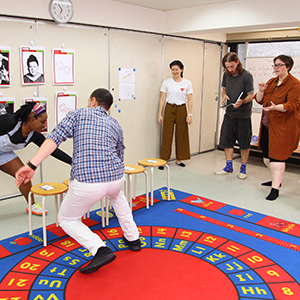
Drama Method® Training for English Teachers
These workshops and classes are held to instruct and guide English teachers working in traditional school settings (generally, but not limited to, grade schools, junior high schools and high schools). Such instructors are given training so that they can teach English using the Drama Method®.
Corporate classes and
Staff Training (in Companies)
These classes, workshops and training sessions aim to teach corporate and company staff English and communication skills. As companies become more global the need for their employees to be able to communicate in English is becoming more important; the Drama Method® offered by MLS offers many ways for staff to achieve just this. The feedback from these corporate programs has been very positive and the Drama Method® has met their needs of having their employees ‘not only acquire ordinary English skills, but also acquire the skills necessary for business affairs and self-expression as well as communicational skills’. MLS has given customized trainings to the following companies: Microsoft、Boston Scientific Japan、Itochu Corporation….and more.

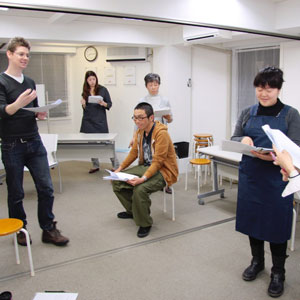
Actor Training
The Drama Method® is used to help actors prepare for performances in English and for working on the set of English films and other dramatic contexts. Tailor-made courses and trainings are conducted to rehearse lines and sceaccnes for such performances. MLS has worked with actors and in other contexts involved with the following productions: The Last Samurai, Sayuri, Silk, Iwojima… etc.
MLS Today
MLS can be briefly described as an educational service, providing high-quality lessons to those who wish to have proficiency in English or to improve their English skills. It is important to remember that MLS is comprised of its customers (students). MLS is a private business that provides an educational service; therefore no matter how effective something is educationally, if it will potentially harm the business then it must be avoided. MLS is dedicated to providing high-quality educational services while maintaining the interests of the business.

Organization of MLS
Currently MLS operates 19 studios in the Metropolitan area which are grouped into different areas for managerial purposes. Most studios consist of only classroom spaces and have no full-time clerks, so all office work is performed centrally at Head Office located in Yoyogi.

Junior Classes
The goal of MLS is to use the Drama Method® to teach students from a young age to speak English like a native speaker. Accordingly, we are emphasizing English education for preschool children and developing a program which will result in bilingual capabilities. We are viewing various English proficiency tests such as Eiken as a positive challenge which will quantify the results of our programs.

Adult Classes
These classes are offered starting at the junior high school age. The overall goal of Adult classes remains the same as that of Junior classes: to teach English communication. There are two basic types of Adult classes: Drama Course and Conversation Course. Both types of classes focus on dialogues and performances; Drama Courses lead to an end of the year on-stage performance.

Production Classes – Producing Plays
for English Language Learning
These classes are for students of all ages and have a focus on the production and performance of a play done entirely in English. While there is more of an emphasis on acting and stage production, the primary goal is that of English language learning and communication.

Drama Method® Training for English Teachers
These workshops and classes are held to instruct and guide English teachers working in traditional school settings (generally, but not limited to, grade schools, junior high schools and high schools). Such instructors are given training so that they can teach English using the Drama Method®.

Corporate classes and
Staff Training (in Companies)
These classes, workshops and training sessions aim to teach corporate and company staff English and communication skills. As companies become more global the need for their employees to be able to communicate in English is becoming more important; the Drama Method® offered by MLS offers many ways for staff to achieve just this. The feedback from these corporate programs has been very positive and the Drama Method® has met their needs of having their employees ‘not only acquire ordinary English skills, but also acquire the skills necessary for business affairs and self-expression as well as communicational skills’. MLS has given customized trainings to the following companies: Microsoft、Boston Scientific Japan、Itochu Corporation….and more.

Actor Training
The Drama Method® is used to help actors prepare for performances in English and for working on the set of English films and other dramatic contexts. Tailor-made courses and trainings are conducted to rehearse lines and sceaccnes for such performances. MLS has worked with actors and in other contexts involved with the following productions: The Last Samurai, Sayuri, Silk, Iwojima… etc.






